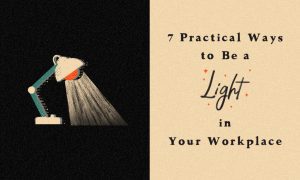4 Ways to Handle Pressures to Conform at Work
Written by Andrew Laird, Australia
Andrew works in Australia for City Bible Forum and is the National Manager of their Life@Work program which aims to help Christians connect their faith with their daily work. He is the author of two books about work, including Under Pressure: How the Gospel Helps Us Handle the Pressures of Work. He is the former Dean of Ridley College’s Marketplace Institute, and he also has a background in radio journalism. He lives in Melbourne, is married to Carly and has three young children. He’s not ashamed to admit he’s a MAMIL (Middle Aged Man In Lycra) and loves getting out on his road bike.
I was only 23 when I landed my dream job, working for a major commercial radio newsroom in Sydney. I’d only been in the job for a short time before I began to discover how difficult this might be as a Christian.
During one shift, I answered a call from someone who wanted to speak to my boss. I put the call on hold and told my boss about it, only for him to say, “Tell him I’m not here”. I was torn. He was instructing me to lie. I didn’t want to do that . . . but I also didn’t want to let my boss down. So, I returned to the call and said what I had been told to say.
The scenario has stuck in my mind as one of the first times I really felt the pressure that many of us face, to conform to the patterns and culture of our organisation when our ethics are challenged in the workplace. Sometimes the challenge can be far greater, and with serious consequences if we push back. Having to support a social agenda our workplace is mandating, or being pressured to use unethical tactics to get business. Or simply feeling forced to join in ungodly social activities outside of work hours just to show camaraderie.
How do we handle these situations and the pressure to conform?
In recent years I have found a framework very helpful for navigating these pressures—the four postures that the Bible encourages us to adopt in how we relate to the world around us.[1]
1. Cooperation
In Romans 12:18 the Apostle Paul writes: “If it is possible, so far as it depends on you, live at peace with everyone”. Paul’s starting point for how we should interact with the world is to cooperate peacefully as much as possible with those around us and the culture we find ourselves in. While we will never find the ethically perfect workplace, we can still seek to do good amid the messiness.
For example, we might be a teacher in an education system that seems more concerned with profit than the education of children. Nevertheless, we’ll seek to make the shaping of minds our focus. Or we might work for a law firm that pushes us to increase client numbers at the cost of genuine, personal care. We can still take time to be attentive to our clients’ personal circumstances, while seeking to honour our employer’s wish to grow our client base.
This way, we peacefully cooperate in an environment that is not ideal so we can still achieve good for the sake of others.
2. Subversion
Sometimes, though, we will need to move beyond cooperation to subversion. This is where we handle the pressure to conform by acting in ways that subvert and challenge the culture of our workplaces. We push back against the pressure we are experiencing, not with our words, but with our actions. We see Jesus doing this when He ate meals with sinners.
I remember the first time I saw a Christian boss of mine put himself on the worst shift on our roster at work. It was the shift that only the most junior employee ever took, but he was subverting the culture of our industry, refusing to conform to how the world expected bosses to act. Instead, he was humbling himself, placing himself below his rightful station, taking on the form of a servant. Rather than conforming, he was being transformed (Romans 12:1).
A simple way that I have tried to subvert workplace cultures is by saying sorry. If you work in an office where no one ever apologises and then you say “sorry”, that is an act of subversion. You’re refusing to conform to the pattern of that office.
Or it might be how you respond to a heavy after-work drinking culture. Cooperation might look like going and seeking to be a positive sober influence there, and even taking care of colleagues who might need help at the end of the night. While subversion might look like organising other social activities (not in competition to, but in addition to), like a family friendly picnic on a weekend. There is a good chance you are not the only one in your workplace who finds the afterwork events uncomfortable, irrespective of whether they are Christian or not. So, take the initiative to organise alternative social events!
3. Exposure
However, there may be times where we will be required to do more than cooperate or subvert. There may come a time when we must stand up to something. As Scripture says: “Have nothing to do with the fruitless deeds of darkness, but rather expose them” (Ephesians 5:11).
One of the most famous verses in the book of Esther comes when the Jewish queen finds herself placed in a dangerous position. The Jewish people are being threatened with death, and Esther has a chance to speak up before the king, at potential great cost to herself, even her own life (Esther 4:11). She is counselled by her cousin Mordecai,
“Do not think that because you are in the king’s house you alone of all the Jews will escape. For if you remain silent at this time, relief and deliverance for the Jews will arise from another place, but you and your father’s family will perish. And who knows but that you have come to your royal position for such a time as this?” (Esther 4:13–14, emphasis mine).
Reflecting on this example, author Timothy Keller writes: “If you are unwilling to risk your place in the palace for your neighbours, the palace owns you”.[2] It is likely that in the course of all of our careers we will have to confront our own “Esther moment”, where it comes down to a choice between being owned by the palace and being owned by God.
Of course, we need to keep perspective; not every point of pressure to conform requires exposure. We need the wisdom of God and the wisdom of our Christian community to decide: “Is this a situation where exposure is the best posture, or is it one in which I should employ cooperation or subversion?” However, when a situation arises where we are genuinely convinced we need to call out the darkness in our industry, will we do it, even if it comes at a potential cost to ourselves? [3]
4. Separation
The final posture that the New Testament offers is one that many rush to do first. However, I think it should be a last resort. That is separation.
This is where we realise that the culture of our workplace is so toxic, and our attempts to cooperate, subvert, and even expose have led to no change. In fact, we might feel our faith is being choked out by the “weeds” of that environment. In this case, it is likely right to follow the advice of Paul and “come out from them and be separate” (2 Corinthians 6:17).
If we are faced with this situation, we must also recognise that wherever we go, there will be unethical practices that challenge our faith. We shouldn’t be naive in thinking that simply changing jobs will remove us from having to deal with such problems. In all workplaces in this age, the pressure to conform will be a constant pressure.
Personally, I have only once reached the point where I considered a work environment to be so toxic that I thought it necessary to leave. The context was a narcissistic bullying boss, where I had first applied the above three postures (including exposure, which involved explicitly raising the issues with him and others in leadership, but it was to no avail).
Indeed, others in leadership counselled me to leave, as they themselves also did in due course. This was a very painful situation to go through, and I was thankful for the wisdom of Christian brothers and sisters who counselled me throughout the process. But it was a case of wisdom; for others in the same situation, they may well have decided differently.
Finding support from others
And this is why we need one final resource—our brothers and sisters in Christ. We need the wisdom of a community to determine when to use which posture.
Oftentimes, I find the perspective of others outside of my industry helps me see unethical practices that I’ve become oblivious to because “that’s just the way we do things around here”. On the flipside, I might believe that the situation in my workplace is so bad I should leave, but my brothers and sisters can bring a different perspective and remind me of the challenges in all industries, and instead encourage me to stay with their prayerful support.
Handling this kind of pressure can be costly, and this is why we need our Christian brothers and sisters to support us, especially if the cost is so great that we find ourselves without paid employment for a time. Similarly, if we are counselling our brothers and sisters in Christ to make a costly stand for Him, we should also be ready to provide whatever support and resources they need to do so.
Together, we stand firm in our faith against the pressure to conform.
[1] These postures are taken from Andrew Cameron’s Joined-up life: A Christian account of how ethics works (2011). I have adapted them to apply to the workplace. For more detail, see “How to handle the pressure to conform” in Andrew Laird, Under Pressure: How the Gospel helps us handle the pressures of work (2017).
[2] Timothy Keller, Every Good Endeavour: Connecting Your Work to God’s Work, (London: Hodder & Stoughton, 2014), 123.
[3] I don’t want to trivialise how challenging this might sometimes be, and the potential personal cost involved. But the call to lay down our life and take up our cross means to walk faithfully will sometimes be extremely costly. However, we do not count the cost alone. Below I suggest the importance of the Christian community supporting those whose “whistle-blowing” costs them professionally, financially, or in other ways.













Hi Andrew,
Thank you for your well-written article ‘how to handle pressure to conform at work’. I’m now retired but could identify with your experience. God always knows best.
Dieter, Adelaide